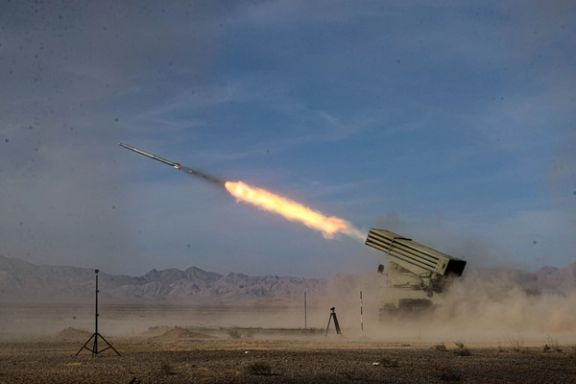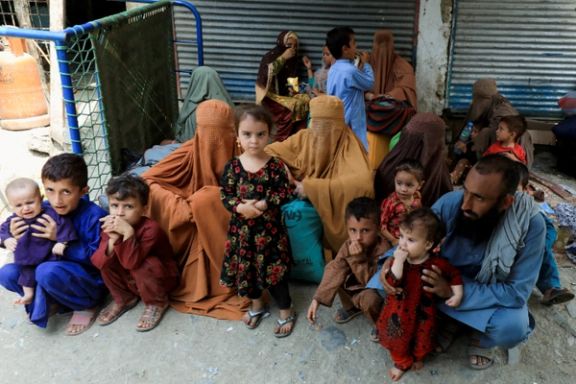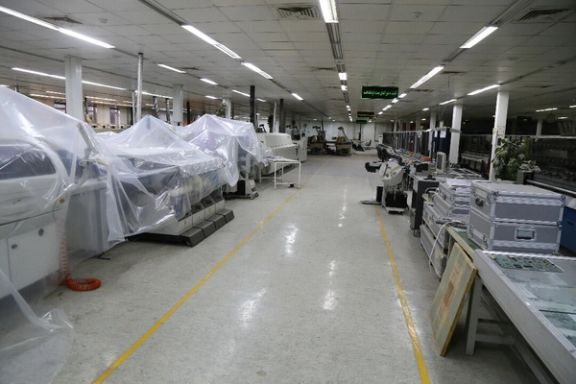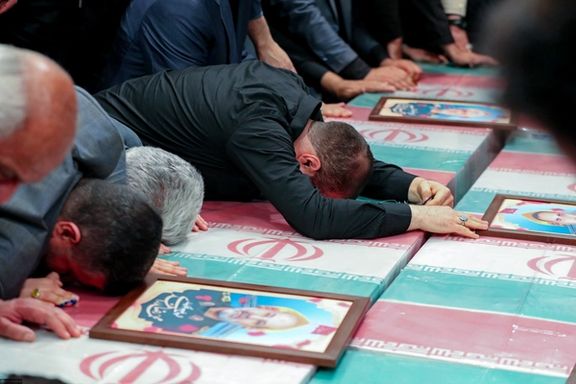Iran May Attack Israel From Inside Its Territories – CNN

The US believes Iran may attack Israel from inside its territory as Tehran officials constantly vow revenge for the deaths of top IRGC generals in an Israeli strike in Damascus, CNN reported.

The US believes Iran may attack Israel from inside its territory as Tehran officials constantly vow revenge for the deaths of top IRGC generals in an Israeli strike in Damascus, CNN reported.
“The US had observed Iran moving military assets around internally, including drones and cruise missiles, signaling that it was preparing to attack Israeli targets from inside its own territory,” the report quoted two informed sources as saying.
According to one CNN source, Iran has recently been tracked to have readied around 100 cruise missiles. “It was not clear whether Iran was preparing to strike from its soil as part of an initial attack, or if it was posturing to try to deter Israel or the United States from conducting a possible counter strike on its territory,” the report added.
Washington also believes that Tehran might involve its regional proxies in its retaliatory attack and that the potential targets can be both on the Israeli soil and abroad, the CNN said.
Earlier on Friday, the White House confirmed that Iran’s threats against Israel are “real,” “viable” and “credible.”
Meanwhile, US President Joe Biden told reporters that Iran’s reprisals would occur “sooner than later,” but the regime “will not succeed” as Washington is committed to Israel’s security and will help it defend itself against threats.
On April 1, Israel launched a precision missile strike on Iran's consulate building in Damascus, killing 7 IRGC forces, including Mohammad Reza Zahedi, the highest-ranking commander of the Iranian Revolutionary Guards Quds Force (IRGC-QF) in Lebanon and Syria. Since then, Supreme Leader Ali Khamenei and other senior Iranian officials have vowed revenge against Israel.

President Joe Biden all but confirmed Friday night that his “Don’t” message to the Iran's government would not stop its looming retaliatory attack against Israel.
“Sooner rather than later,” he said, when reporters asked him about the timing of Iran’s seemingly imminent attack, reiterating that the US is “devoted to the defense of Israel” and would not allow Iran “to succeed.”
Many Iranian officials have been walking the line drawn by their Supreme Leader Ali Khamenei during his speech on Wednesday, that Israel has to be “punished” for bombing Iran’s consulate in Damascus, and killing two senior Revolutionary Guards (IRGC) commanders.
On Friday, IRGC’s deputy commander of operations General Abbas Nilforushan posted an image resembling a missile with the quote by Khamenei written on it: “The Zionist regime made a mistake by attacking the Iranian consulate. It should be punished and it will be.”
For a moment Friday night, it seemed like the ‘punishment’ had started, with Hezbollah firing 40 rackets towards Israel. It had no follow up, however. The Israeli army announced that it had shot down most rockets and that those slipping through had hit open spaces.
After three days of speculation, laden with media reports quoting anonymous American sources, some began questioning the veracity of the underlying intelligence, suggesting that the regime in Iran could be playing a mind game, sowing confusion, and shaking Israel without so much as raising a finger.
But most governments seem to continue to take the threat seriously, advising their citizens to avoid traveling to –or even leave– Iran and Israel. European airlines Lufthansa, Austrian, and Air France, have suspended their flights to and from Tehran. Australian airline Qantas has paused its non-stop flights from Perth to London because the 17.5 hour flight is possible only by using Iranian airspace.
Airlines are perhaps more concerned because the memory of Iran’s last “hard revenge” is still fresh –when on January 8, 2020, following the assassination of Iran’s preeminent military man, Qassem Soleimani, the IRGC shut down the Ukrainian passenger flight PS752, killing all 176 on board. First Iran denied it had targeted the plane with two anti-air missiles, but then grudgingly admitted its role but claiming it was a missile operator error.
Many in Iran fear that they would end up paying the price, however the current crisis unfolds. A ‘significant’ attack on Israeli interests, as predicted by US intelligence, could beget severe retaliation from a beleaguered Netanyahu looking to reassert his authority. And a decision to not retaliate against Israel, many Iranians fear, could mean their government channeling its rage and anxiety inwards, taking it on the people instead of foreign militaries.
“Ali Khamenei is trying to start a war to save his failing regime,” Iranian Prince Reza Pahlavi posted on X. “But this is not a war that our nation wants. Iranians have made it clear: the criminal mafia occupying Iran does not represent our nation, our values, or our aspirations.”
In reality, the wishes or aspirations of ordinary Iranians has very little bearing on the looming crisis. The likeliest scenario, still, is Iran attacking Israeli interests through allied armed groups in the region.
CNN reported late Friday that US intelligence has observed some movement of Iranian military assets, including cruise missiles and one-way drones around the country. This may hint at direct strikes against Israel from Iranian territory, which contradicts other intelligence suggesting any potential operation would be launched by Iran’s proxies.
According to the report, US officials are unsure if these movements are offensive preparations or defensive measures in anticipation of a joint Israeli-American retaliatory strike.
Follow developments on Iran International's Live coverage of ongoing tensions between Iran and Israel.

Last year, Iran deported over 20,000 Afghan children, many of whom have been sent back unaccompanied and without any guardians waiting for them, Afghan authorities stated.
"Around 30 to 40 children without guardians are deported from Iran every day… Last year, 20,000 expelled children were registered with us," Mohammad Haroon Wahedi, who heads migrant affairs in the Nimroz Province bordering Iran, told Afghan news outlet TOLOnews.
Atiqullah, a 12-year-old Afghan boy recently deported from Iran, confirmed this to TOLOnews, stating that Iranian authorities expelled him without his family. "Out of necessity, I went to Iran to work. I was busy working in a bakery, where I would take four or six loaves of bread home daily,” he said.
Mohammad, another child who was deported, said, “On the way to Iran, I was caught and transferred to Afghanistan, and now I have no money and don't know what to do.”
Just 3,000 of the children deported from Iran were reunited with their families across various provinces in Afghanistan, according to Alauddin Amiri, the head of labor at the Directorate of Labor and Social Affairs in Nimroz province.
Zubair, another young deported child, said: "We went to Iran due to economic problems... but the Iranian government arrested me, and I want the United Nations to cooperate with us".
Momen, another deported child, echoed Zubair's sentiment, saying that he simply wants to return home to his family. They called for financial assistance from both the government and the United Nations.
According to Alauddin Amiri, the head of labor at the Directorate of Labor and Social Affairs in Nimroz, "In the past year, we have been able to transfer nearly 3,000 unaccompanied children who were sent from Iran to Nimroz to their families in different provinces."
While the exact number hasn't been independently verified, the Iranian authorities recent actions support the claims.
Earlier this week, the Iranian Interior Ministry issued a directive – saying that it can no longer accept new Afghan arrivals due to the economic crisis and rising public discontent over the increasing number of Afghan migrants, both documented and undocumented. The directive called for all illegal Afghan migrants to leave or face deportation.
On March 21, the IRGC-affiliated Tasnim News Agency reported the initiation of a police plan aimed at gathering and deporting unauthorized immigrants from recreational areas in Tehran Province.
Painting a grim picture for Afghan migrants, Zahra Azizi, an Afghan journalist living in Tehran, told Radio Azadi -- the Afghan branch of Radio Free Europe -- that migrants are now “not even given bread when they go to bakeries, even the census papers of some of them have been torn up by the police, and hospitals charge Afghan migrants two or three times more money because they do not have insurance.”
Afghanistan's history of migration, especially to neighboring countries like Iran and Pakistan, has often accelerated due to conflicts including the civil war that began in the late 20th century.
But once the migrants arrive in their new destinations, especially in Iran, they face significant challenges regarding residency, education, and employment.
Reports of the detention and expulsion of foreign nationals from Iran have become increasingly common in recent months. Although these reports often do not specify the nationalities of those affected, it is widely understood that a significant portion are Afghan citizens.
The influx of Afghan migrants into Iran has sparked debate among citizens and officials alike, with differing opinions on whether their presence poses a threat or an opportunity for the regime.
Estimates of the Afghan diaspora population in Iran vary, with precise figures challenging to ascertain due to the reluctance of Afghans to participate in official counts and registrations.

For almost two decades, nearly 1,300 retired workers for a telecommunication company in Iran have not received their benefits, wages, and pensions, according to the workers’ union.
Speaking to the semi-official state broadcaster ILNA, Hashem Shamshiri, the head of the retirees’ union, lamented the authorities' failure to fulfil their promises to compensate the workers for the company based in Shiraz in southwestern Iran.
About 125 retirees passed away, before receiving their benefits.
Despite pledges by the company to resolve the retirees' claims before the Persian New Year in March, the workers have yet to be given their wages.
The retirees have resorted to protests on numerous occasions, including in 2021 when they held a rally in Shiraz, and their demands for their rights were met with violent attacks by the state police.
The lack of compensation has impacted at least 1,000 households – leading to much frustration among the families and retirees.
The company owes 1,300 retirees about 1 trillion Rials in wages, damages and accrued interest. At the current exchange rate, this amount is approximately $1,200 USD (770 million Rials) per retiree. However, before the steep devaluation of Iran’s currency in 2018, this amount would have equaled tens of thousands of dollars per retiree.
The company has reportedly faced economic hardships after its privatization in 2005. As the main investor in Iran Telecommunication Industry (ITI), Asia Tech Company holds the key role in resolving the nonpayment of employees.
Disregard for workers’ rights is not an isolated incident limited to ITI — but, part of an ongoing crisis faced by many workers in Iran across multiple sectors including education, oil and gas, and steel.

Iran may keep Israelis in a state of anticipation and apprehension for a while but will eventually retaliate for the attack on its embassy in Damascus last week, analysts say.
Israeli Foreign Minister Israel Katz says Israel has not taken responsibility for the attack that killed seven top Iranian Revolutionary Guard commanders, but in his Eid al-Fitr sermon on Wednesday, Iran’s Supreme Leader Ali Khamenei held Israel responsible and promised retaliation.
Iranian officials and media have largely been silent on Friday over the prospects of a retaliation, but after reports of an attack being imminent, Khamenei’s X account retweeted the same remarks without further comments.
Two US officials told CBS News that a major Iranian attack against Israel was expected as soon as Friday, possibly to include more than 100 drones and dozens of missiles aimed at military targets inside the country. The White House National Security Council spokesman John Kirby also said on Friday that an Iranian strike on Israel was possible.

Most analysts believe the Israeli strike on the Damascus embassy that the Iranian regime calls “Iranian soil” has left no other choice for the Islamic Republic than to strike back as a matter of principle and honor.
“They will retaliate but will try to keep Israelis on their toes and perplex them as long as they can before initiating an attack,” an analyst in Iran who requested anonymity told Iran International.
“For instance, they may deploy a hundred missiles to one location in the country, then move them to another. Or put their forces in a state of high alert in one place, then rescind the decision without explanation, or move them to another location,” he added.
Reports from Israel Friday indicated that Iran's use of this psychological warfare tactic has already made a lot of Israelis very nervous.
Iran International’s correspondent Babak Itzhaki in Jerusalem reported on Friday that the feeling is prevalent in Israel that the Islamic Republic and Israel’s exchange of threats and warnings has reached a final point and caused worry to the public.
Rather than preparing to get together for Sabbath as they always do, Israeli families are staying home to remain close to their safe rooms, he says, adding that municipalities are preparing themselves for some sort of attack and have been ordered to open up shelters to people if Iran's threats materialize although new instructions have not been issued so far for extra measures.
A source in Tehran told Iran International that while people are preoccupied with various local issues and controversies, the looming threat of escalation, potentially culminating in an Israeli attack on Iran, is a cause for concern. Their primary worry revolves around the potential further rise of the US dollar in Tehran and the subsequent increase in the severity of their living conditions. The Iranian currency, the rial, has depreciated by 30 percent since early January, exacerbating inflation, which is already hovering around 50 percent.
Iranian sources and diplomats from the US say Tehran has signaled to Washington that it wishes to avoid escalation and will not act hastily, Reuters reported.
“Iran wanted condemnation of Israel’s attack on the Iranian embassy by the United States, western countries and the United Nations Security Council as Foreign Minister Hossein Amir- Abdollahian pointed out,” the Iranian analyst said, adding that the only way for the Islamic Republic to hold off an attack and not to lose face is getting a big concession. “They may be maneuvering now to increase the price of holding off an attack on Israeli soil,” he added.
Iran has already begun exhibiting its preparations. According to the semi-official Iranian Students News Agency (ISNA) which cited the Army, the air defense chief of northern Iran, Brigadier General Amir-Mohammad Sadeghian, on Friday inspected “the combat readiness, equipment, and response protocols” of the force.
"It's going to be very difficult for Iran not to retaliate," Raz Zimmt, senior researcher at Israel's Institute for National Security Studies also told Reuters.
"I still believe that Iran doesn't want to engage in full-scale, direct military confrontation against Israel, and certainly not with the United States. But it has to do something," he added.
Follow developments on Iran International's Live coverage of ongoing tensions between Iran and Israel.

The European Union is imposing sanctions against three Hamas and Palestinian Islamic Jihad entities, over “widespread sexual and gender-based violence” that occurred across Israel on October 7.
“The Council decided today to list three entities under the EU Global Human Rights Sanctions Regime in view of their responsibilities in the brutal and indiscriminate terrorist attacks that occurred across Israel on 7 October 2023,” a press release read.
The sanctions target the Al-Quds Brigades, the armed wing of the Palestinian Islamic Jihad, the Nukhba Force (special forces unit of Hamas) and the Qassam Brigades (military wing of Hamas).
Israel’s Foreign Minister, Israel Katz, took to X to laud the decision, saying it “sends a clear message: those who murder, rape, burn, abuse the bodies of babies, girls, women, and men, and commit atrocities against humanity -- will pay the price.”
Individuals and entities listed under the sanctions regime face an asset freeze, meaning their financial assets are blocked. Providing them with funds or economic resources, either directly or indirectly, is prohibited. Persons listed are also banned from traveling to the EU.
The EU had already classified Hamas and the Palestinian Islamic Jihad as terrorist entities.
Last month, the UN Special Representative on Sexual Violence in Conflict reported that she and a team of experts found “clear and convincing information” of rape and sexualized torture being committed against hostages seized during the 7 October terror attacks.
Pramila Patten said that in addition there are also reasonable grounds to believe that such violence, which includes other “cruel, inhuman and degrading treatment”, may be continuing against hostages still being held by Hamas and other extremists in the Gaza Strip.






